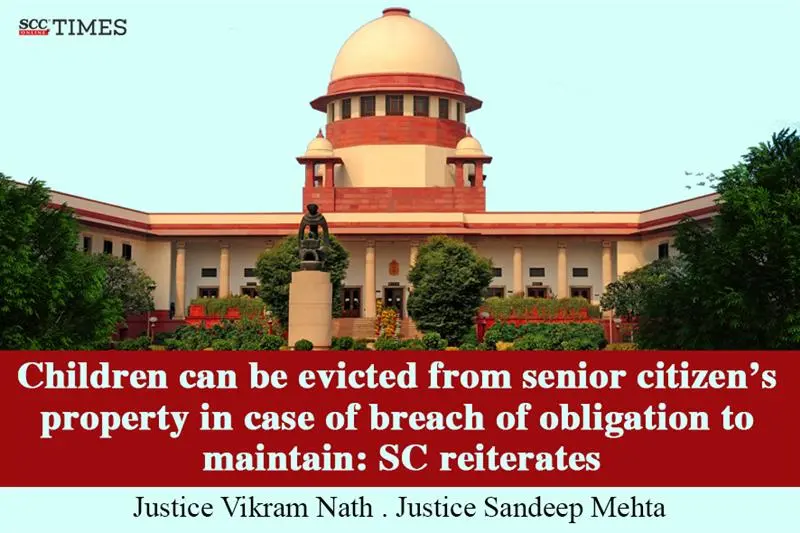Supreme Court: While considering this appeal wherein a senior citizen (appellant) was aggrieved by Bombay High Court’s decision to set aside the eviction order passed against his eldest son by the Maintenance Tribunal (the Tribunal); the Division Bench of Vikram Nath and Sandeep Mehta, JJ., reiterated that the Tribunal is well within its powers to order eviction of a child or a relative from the property of a senior citizen, when there is a breach of the obligation to maintain the senior citizen.
The appellant is a senior citizen, aged about 80 years with a 78-year-old wife and three working children. The appellant had purchased two properties and had moved to Uttar Pradesh leaving their children behind in the purchased properties. However, the eldest son had taken the properties in his possession, and he did not allow the appellant to reside in them.
On 12-07-2023, appellant and his wife filed an application under Section 22, 23, and 24 of the Maintenance and Welfare of Senior Citizens Act, 2007 (Senior Citizens Act) praying for maintenance and eviction of the eldest son from the purchased properties. The Tribunal allowed the application and directed the eldest son to hand over the possession of both the premises and further directed maintenance of Rs 3,000 per month to be given to the elderly parents. The Tribunal’s order was confirmed by the Appellate Tribunal.
Aggrieved with the afore-stated verdict, the eldest son petitioned the High Court praying for setting aside of eviction orders. The High Court vide order dated 25-04-2025 allowed the petition observing that the Tribunal does not have the jurisdiction to pass an order for vacation of the property against a senior citizen.
Perusing the present appeal, the Supreme Court pointed out that Bombay High Court had proceeded on the presumption that the eldest son was also a senior citizen as per Section 2(h) of the Senior Citizen Act, as his date of birth was 04-07-1964. It observed that the Tribunal could not have allowed appellant’s complaint since it was made against another senior citizen. The Court opined that this view was erroneous as the record showed that the appellant had moved an application before the Tribunal on 12-07-2023 and at that point in time the eldest son’s age was 59 years. Relevant date for consideration would be the date of filing the application before the Tribunal.
The Court further emphasised that the Senior Citizens Act was enacted to address the plight of older persons, for their care and protection. Being a welfare legislation, its provisions must be construed liberally so as to advance its beneficent purpose.
The Court pointed out that despite being financially stable, the eldest son had acted in breach of his statutory obligations in not allowing the appellant to reside in the properties owned by him, thereby frustrating the very object of the Senior Citizens Act. Thus, the High Court fell in error in allowing the writ petition on a completely untenable ground. Therefore, the Court allowed the appeal and the High Court’s judgment was set aside.
[Kamalkant Mishra v. Additional Collector, D. NO.42786 OF 2025, order dated 12-9-2025]
Advocates who appeared in this case:
For Petitioner(s): Ms. Deeksha Saggi, Adv. Mr. Abhishek Usha Singh, Adv. Mr. Rishabh Singh, Adv. Mr. Gaurav Mishra, Adv. Mr. Rituparn Uniyal, AOR
For Respondent(s): Mr. Navneet Dugar, AOR Mr. Jainam Vimal Gadiya, Adv. Mr. Pawankumar Shrinath Pal, Adv.







